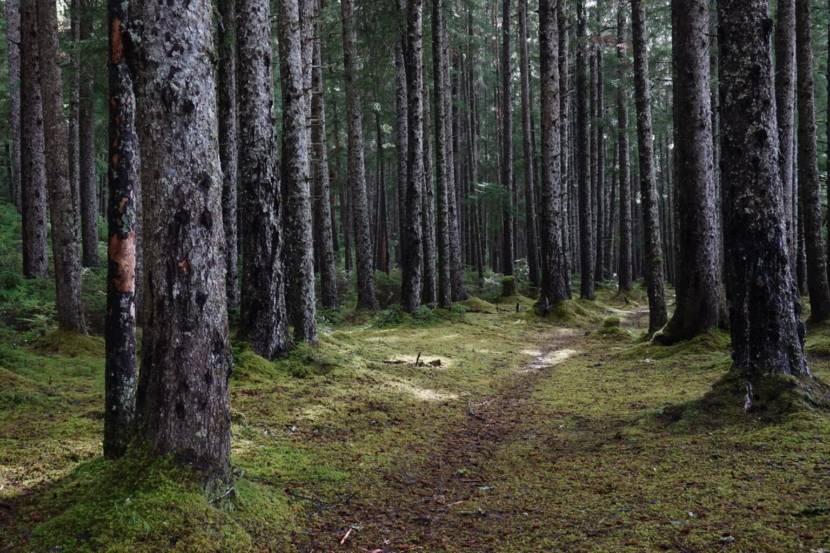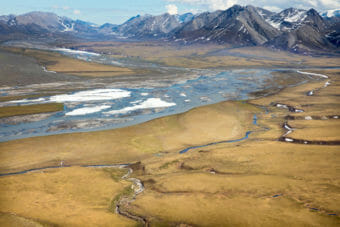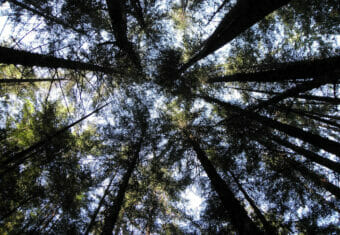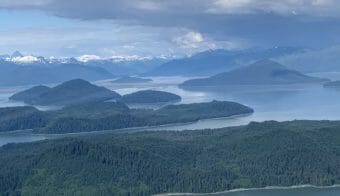
The Biden administration announced Thursday it’s freezing any remaining old growth timber sales in Tongass National Forest and will pivot to investing in other sectors of Southeast Alaska’s economy.
A statement from the U.S. Department of Agriculture said the federal government will invest $25 million and work with tribes, communities and Alaska Native corporations to provide technical assistance for projects and employment programs in the region.
“This approach will help us chart the path to long-term economic opportunities that are sustainable and reflect Southeast Alaska’s rich cultural heritage and magnificent natural resources,” Secretary of Agriculture Tom Vilsack said.
Thursday’s statement follows a recent announcement that the agency will start a lengthy process to reinstate the Roadless Rule in the Tongass, which restricts road building on federal forest lands.
That reverses the Trump administration’s decision to exempt the nation’s largest national forest from the Clinton-era rule that’s been fought by successive Alaska governors.
Dunleavy administration lambasts USDA
In a statement, Alaska Gov. Mike Dunleavy called out what he called President Biden’s “efforts to put Alaska workers permanently into unemployment lines and wipe out small businesses” with Thursday’s announcement.
“Narrow election results and political donations from environmental groups do not justify this federal agency’s policy flip-flop,” the governor said.
But the pivot away from forest products and toward other sectors was met with applause from the visitor industry.
“As we’ve been saying for a long time there’s so much else going on in Southeast Alaska that needs the Forest Service’s attention,” said Dan Kirkwood, a guide and general manager of Alaska Seaplane Adventures in Juneau. “We’re finally seeing some recognition that Southeast Alaska is really diverse in its economy and its cultures and the Forest Service’s trying to work on that. So that’s interesting.”
There have been few details released on the USDA’s $25 million “Southeast Alaska Sustainability Strategy,” but Southeast Conference’s executive director says meetings have been set up to discuss mariculture opportunities on and around Prince of Wales Island.
“The Tongass needs to be a multi-use forest. And unfortunately it’s still very much a political football that goes back and forth,” said Robert Venables. “So my hope is that we can work with the Forest Service’s stakeholders to really create more stability and at least many of the economic sectors and provide a longer term blueprint and map to go forward.”
Freeze on old growth logging announced
The practical effect of Thursday’s announcement would be to freeze any remaining old growth timber sales except for those used in small scale salvage projects for cultural use by Alaska Native tribes and others.
“The announcement that large scale, old growth logging is going to be ceased is very positive for that because those mass clear cuts are not going to occur here anymore,” said Marina Anderson, tribal administrator for the Organized Village of Kasaan on Prince of Wales Island.
“We hear commonly that we’re doing this for the next seven generations, or the seventh generation down the line,” she said. “However, we’ve been here for over 10,000 years, and we plan on being here for well over 10,000 years — we don’t have an expiration date on ourselves because we are part of this ecosystem.”
The largest timber sale in Tongass was already blocked by litigation. And only two old growth timber sales on Prince of Wales Island and near Ketchikan are in the works. A Tongass spokesperson says the local office is awaiting guidance following the announcement.
The announcement also didn’t mention amending the 2016 forest plan, which laid out a 15-year transition from old growth to second-growth logging. That would require a formal rulemaking process to ensure protections would last another political transition.
Proponents of ending old growth logging say they hope the shift in policy represents a long-term move away from Southeast Alaska’s federal forestland as primarily a supply for forest products.
“Any future administration is going to have the opportunity to pick its own policies and implement its own direction,” said Austin Williams, Trout Unlimited’s Anchorage-based legal director. “But I think what we’re seeing is that, as time goes on, the value of fish and wildlife, the cultural assets in the forest, the value of scenic beauty and climate resiliency — those values are becoming more and more important.”
The USDA notes that the Tongass has global significance as the largest intact temperate rainforest in the world. It also captures more carbon than any other national forest in the country.
Fate of lawsuits uncertain
There have been lawsuits filed on both sides of the Roadless Rule exemption issue. A coalition of tribes and conservationists has sued to overturn the Trump administration’s decision. And a separate lawsuit is defending the Roadless Rule exemption backed by local governments and industries.
Juneau attorney Jim Clark has been coordinating that effort to defend the Trump administration’s action. He says it’s not clear how the Biden administration plans to carry out its goals.
“We know where they’re headed and where they’re trying to go,” said Clark, who served as chief of staff for Republican Gov. Frank Murkowski. “And what we’re going to need to see is how they move to achieve those things.”


